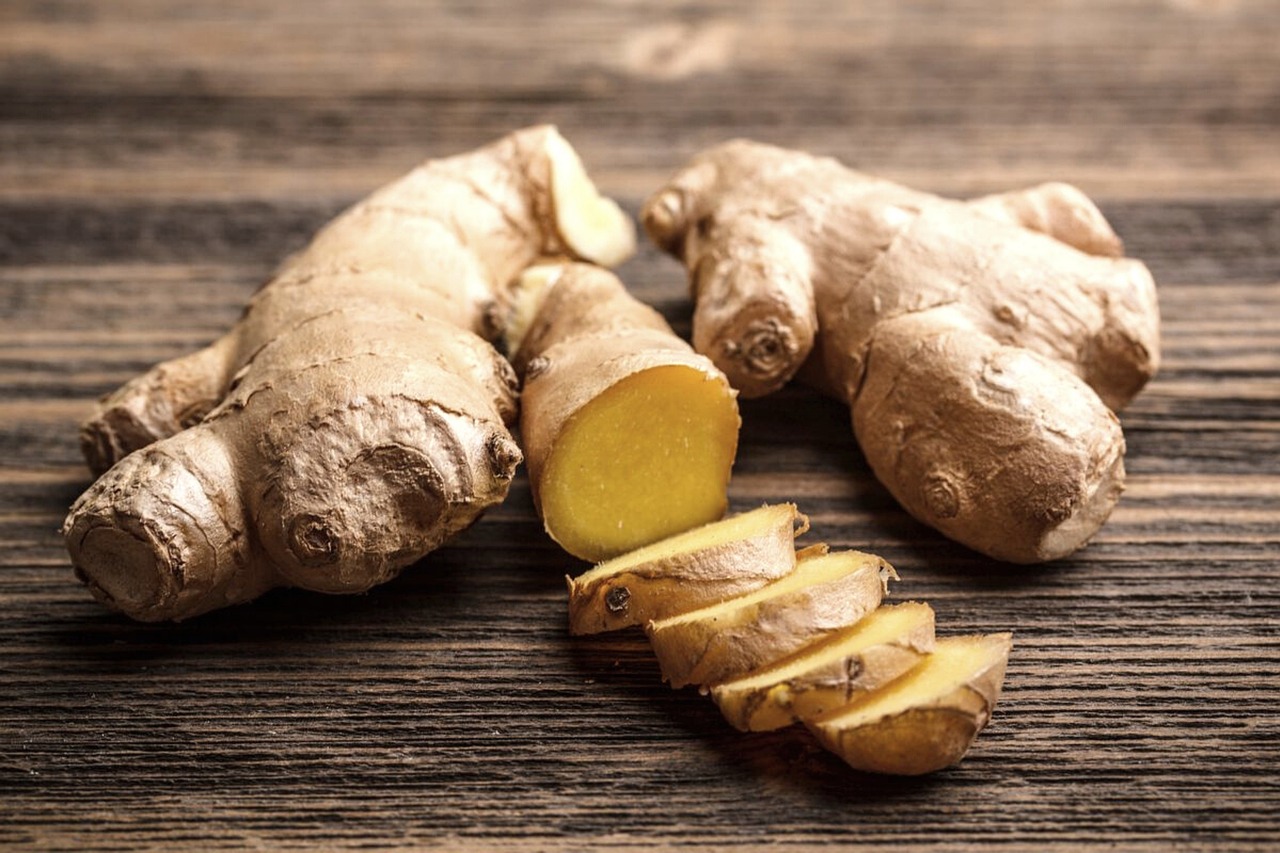
Ginger, a flowering plant from Southeast Asia, is primarily cultivated for its rhizome, which is widely used as a spice. It has a long history in Ayurvedic, Chinese, and traditional medicine, known for its anti-inflammatory, antioxidant, and antimicrobial effects. Key active compounds like gingerol and shogaol provide many health benefits, including reducing inflammation and boosting immune function. Nutritionally, a 100-gram serving of fresh ginger contains about 80 calories, 1.8 grams of protein, 18 grams of carbohydrates, 2 grams of dietary fiber, and small amounts of vitamins and minerals like vitamin C, magnesium, and potassium. The active compounds in ginger are crucial to its health-promoting properties. Incorporating ginger into your daily routine is simple due to its versatility in various dishes. You can make ginger tea by steeping fresh ginger slices in hot water, enhancing it with honey or lemon. For smoothies, add grated ginger for flavor and antioxidants. In stir-fries, combine fresh ginger with vegetables, meats, or tofu for extra taste. Ground ginger can enhance baked goods like gingerbread and cookies. You can also include ginger in fresh juices or detox drinks for health benefits. Alternatively, ginger supplements in capsule or powder form are available for those seeking a concentrated option to support overall health. Here are few health benefits of Ginger listed below-
- Improves immunity- Ginger has been used traditionally for respiratory issues in systems like Ayurveda and Traditional Chinese Medicine. Its warming properties, ability to clear mucus, and anti-inflammatory effects make it effective for treating respiratory infections. Ginger can alleviate airway inflammation and relax bronchial muscles, benefiting asthma and bronchitis patients. It also helps inhibit mucus overproduction, reducing congestion and wheezing. Furthermore, ginger has antiviral properties that can prevent colds and flu, supporting the immune system during flu season and relieving symptoms like coughing and sore throat. Additionally, ginger can help regulate the immune response, potentially reducing allergic reactions by inhibiting histamine release, making it a natural antihistamine effective during allergy seasons. To enhance ginger’s immune-boosting effects, it can be paired with other superfoods. Popular combinations are ginger with turmeric, which together promote immunity and reduce infection risk; ginger with garlic, known for its antiviral and antibacterial properties, creating a strong natural remedy; and ginger with lemon, which adds vitamin C for additional antioxidant support and encourages immune cell activity.
- Aids digestion- Ginger is recognized for its effectiveness in alleviating nausea and vomiting, making it useful for various digestive issues. It is often used to ease morning sickness in pregnant women without negative side effects and can reduce nausea in patients undergoing surgery or chemotherapy, serving as a natural alternative to medication. For individuals prone to motion sickness, consuming ginger before travel may help prevent symptoms like dizziness and nausea. Additionally, ginger improves the body’s nutrient absorption by increasing the production of digestive enzymes, bile, and stomach acids, which are vital for breaking down food. This enhanced absorption is crucial for overall health, particularly for individuals with iron-deficiency anemia, as ginger helps stimulate the digestive system and improve iron bioavailability. Ginger acts as a carminative, relieving gas and preventing its formation in the intestines, which helps reduce bloating, discomfort, and cramping. It improves digestion, minimizing flatulence and associated discomfort, making it useful for those who experience gas or bloating post-meals. Additionally, ginger helps prevent acid reflux by lowering stomach acid production and enhancing digestion. It also aids in maintaining the function of the lower esophageal sphincter, thus preventing heartburn. Moreover, ginger can stimulate appetite for individuals with reduced hunger due to illness or medication, promoting quicker stomach emptying and increased hunger.
- Promotes heart health- High blood pressure, or hypertension, significantly increases the risk of heart disease and stroke. Ginger aids in lowering blood pressure by acting as a natural vasodilator, which relaxes blood vessels for improved blood flow. It also helps decrease total cholesterol and triglyceride levels, contributing to heart health by reducing the risk of atherosclerosis. Enhanced circulation from ginger leads to better oxygen delivery to organs, improving overall cardiovascular function. Additionally, ginger contains powerful antioxidants that protect the heart from oxidative damage associated with chronic diseases. Its thermogenic properties can boost the body’s metabolic rate, which may help with weight loss and reduce heart strain.
Precautions- Large amounts of ginger may occasionally lead to mild digestive issues like heartburn or diarrhea. It can interact with blood-thinning medications, so those on such medications should consult a doctor before consuming it in large quantities. Ginger is generally safe during pregnancy, but it is advisable to check with a healthcare provider before using it for morning sickness.
-Triparna







